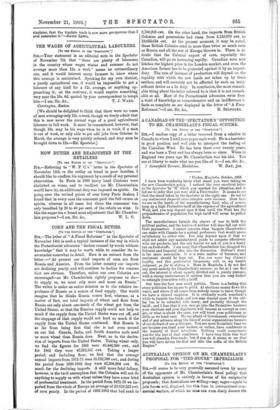CORN AND THE FISCAL DUTIES.
[To THE EDITOR OP THE " SPECTATOR:1
SIR,—The letter of "A Fiscal Reformer" in the Spectator of November 14th is such a typical instance of the way in which the Protectionist advocates "darken counsel by words without knowledge" that it may be worth while to consider its in- accuracies somewhat in detail. Here is an extract from the
letter At present our chief imports of corn are from Russia and America. From the latter country our imports are declining yearly, and will continue to decline for reasons that are obvious. Therefore, unless our own Colonies are encouraged—as Mr. Chamberlain rightly proposes to do— to supply us, we must rely more and more on Russia." The writer is under an entire delusion as to the relative im- portance of Russia as a source of food supply. One would imagine that he thinks Russia comes first, whereas, as a matter of fact, our total imports of wheat and flour from Russia are only about one-tenth of the wheat got from the United States, so that the Russian supply could not help us much if the supply from the United States were cut off, and the stoppage of that supply would not hurt us much if the supply from the United States continued. But Russia is so far from being first that she is not even second on our list. Canada, India, and South America each send us more wheat than Russia does. Next, as to the declen- sion of imports from the United States. Taking wheat only, we find the figures for 1901 were 40,406,300 cwt., and for 1902 they were 43,312,561 cwt. Taking a longer period, and including flour, we find that the average annual imports from 1871-75 were 20,122,599 cwt., and during the period from 1898-1902 they were 62,306,884 cwt. So much for the declining imports. A still more fatal fallacy, however, is the tacit assumption that the Colonies will not do anything to supply us with wheat unless they have some kind of preferential treatment. In the period from 1871-75 we im- ported from the whole of Europe an average of 20,929,323 cwt, of corn yearly. In the period of 1898-1902 that had sunk to 8,760,208 cwt. On the other hand, the imports from British Colonies and possessions had risen from 5,159,070 cwt. to 19,033,634 cwt. At the present moment, it may be noted, these British Colonies send us more than twice as much corn as Russia and all the rest of Europe thrown in. There is m: doubt that the Colonial export of corn, especially the Canadian, will go on increasing rapidly. Canadian corn now fetches the highest price in the London market, and even the American farmer has to be protected against it by an import. duty. The rate of increase of production will depend on the rapidity with which the new lands are taken up by fresh settlers, and will certainly not be affected by such an insig- nificant device as a 2s. duty. In conclusion, the most remark- able thing about the letter referred to is that it is not remark- able at all. Most of the Protectionist advocates write froir a want of knowledge as comprehensive and an indifference ti facts as complete as are displayed in the letter of "A Fisca


























































 Previous page
Previous page